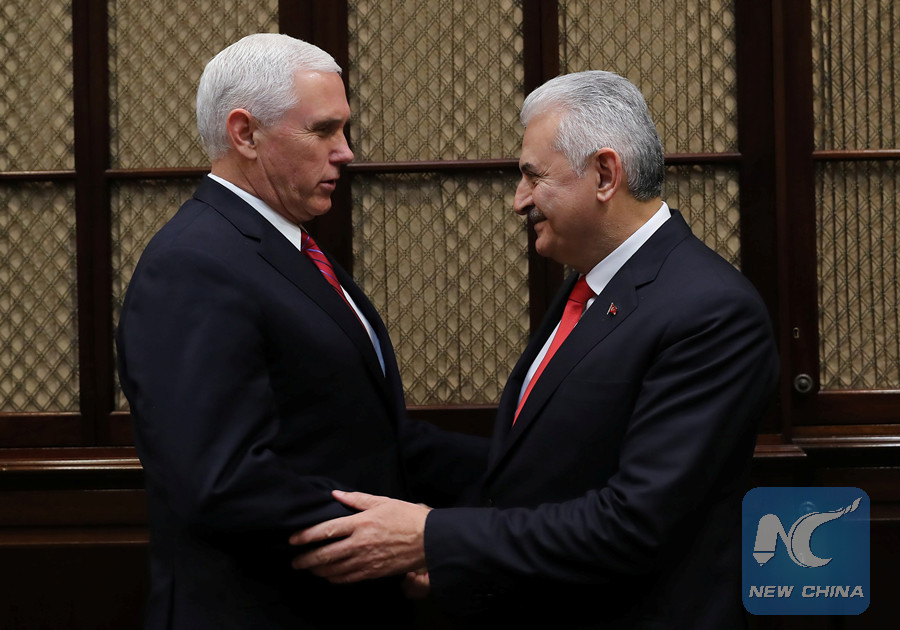
Turkey's Prime Minister Binali Yildirim meets with U.S. Vice President Mike Pence at the White House in Washington, U.S. on Nov. 9, 2017. (Turkish PM's press office)
ANKARA, Nov. 11 (Xinhua) -- Turkish Prime Minister Binali Yildirim's visit to the United States on Nov. 7-10 has not produced a breakthrough on resolving key issues of contention, but the two NATO allies agreed to prevent further deterioration of their bilateral ties.
"There is no apparent agreement on issues that have poisoned bilateral relations, but on a practical level we see that both parties are keen to push for more contact and communication in order to avert that ties are strained even further," told Xinhua Serkan Demirtas, Hurriyet Daily News Ankara bureau chief.
"I think there is a will despite differences on major issues to have relations to return back on track in some way and open communication channels to that effect," said this expert on international affairs and a keen reader of Turkish government issues.
After their tit-for-tat, Yildirim and U.S. Vice President Mike Pence had warm statements on the future of bilateral relations after meeting, yet no breakthrough was announced to clear the air.
There was no sign of the U.S. agreeing to consider extraditing the U.S.-based Muslim cleric Fethullah Gulen, accused by Ankara of masterminding the coup attempt of July 2016, or to stop supporting arming Syrian Kurdish militants that Turkey considers as an offshoot of the Kurdish Workers' Party (PKK), listed as a terrorist group by Turkey, the U.S., and EU.
Meanwhile, Turkey did not give any guarantee to free American evangelical pastor Andrew Brunson jailed since last year for alleged links with the Gulen network.
In his statement after the meeting, Pence relayed his "deep concern over the arrest of American citizens, Turkish local staff, journalists, and members of civil society under the state of emergency," underlining nevertheless the "strategic partnership between Washington and Ankara."
Yildirim defined his discussions with Pence as "very productive." The White House said Pence and Yildirim hoped to "usher in a new chapter" in U.S.-Turley relations. However, it is unclear what exactly ushering in a new chapter means in the actual context of affairs.
"The important thing that comes from this meeting is that communications between the leaders of the two nations may increase in the coming days and this will avert further deterioration," commented Demirtas.
There was also no decision on a full restoration of visa processing. Ankara and Washington eased days before Yildirim's visit reciprocal visa restrictions imposed early October after the arrest of a Turkish worker of the American consulate in Istanbul on charges of espionage and alleged links with coup plotters.
"We expect normalization in the visa crisis, and Mr. Pence has a positive stance on finding a solution," Yildirim said.
Turkey has launched a massive crackdown on Gulen's network after the coup attempt last year, arresting tens of thousands of suspected followers in the army, police and judiciary.
"We demanded that at least a step to restrict Gulen's movements and actions be taken as a start," said Yildirim, adding that the extradition process, which falls in deaf ears in the U.S. government, is long overdue.
Yildirim also met journalists, think tankers and lawmakers in Washington on Tuesday and Wednesday, and in New York met UN Secretary-General Antonio Guterres, Jewish community leaders and investors.
"Relations between Turkey and the United States are going through tough time," said Yildirim to reporters in Washington.
Strained ties are not only about Turkey-U.S. relations, but also about the region in Turkey is located, Yildirim noted.
In Ankara, a source close to the government told Xinhua that "as long as the U.S. harbors Gulen, relations will suffer. But at least we have expressed our firm opinion to the U.S. that we want Gulen back to Turkey to be tried for the deeds that he has done."
"We know and the Americans know it is better to be friends than foes, and relations in difficult global circumstances between the U.S. and Turkey should not crumble like a castle of cards," remarked this source on the condition of anonymity.
Moreover, the case of Reza Zarrab also matters. The Turkish-Iranian gold trader said to be close to the Turkish President Recep Tayyip Erdogan's entourage is currently under arrest in the U.S., and accused of violating U.S. sanctions on Iran.
According to press reports, the investigation could easily have a big negative impact on U.S.-Turkish relations if it implies Erdogan himself or his political connections.
"Such an event could shatter the actual status quo. Thus, so it seems, the two nations have seemingly found some kind of understanding in order to prevent irreversible damage," Serkan Demirtas said.

